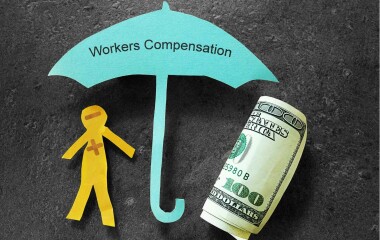Psychological trauma is a mental injury that can occur in connection with work, just like a physical workplace injury.
It arises as a result of dangerous or stressful situations in the workplace. It may be caused by specific events directly related to the performance of one’s professional duties.
When most people think of a workplace injury, they imagine a physical injury – a fracture, a cut, or other visible harm.
However, psychological injuries can be just as serious, sometimes even worse. They can affect not only your professional but also your personal life. Their impact often becomes apparent only after a longer period.
Psychological Trauma of Employees in the Workplace
Psychological trauma in the work environment can take various forms and have different causes. It often arises from extraordinary and highly stressful situations. Most commonly, it is associated with life-threatening situations for you and/or other employees (for example, during a robbery at a gas station, post office, bank, exchange office, etc.) or cases where a death or serious injury occurs in the presence of the employee (such as healthcare workers witnessing a fatal event, or a train driver involved in a collision with a person attempting suicide).
Direct Workplace Injuries with Psychological Consequences
Direct psychological trauma refers to mental injury directly related to your physical injury at work (e.g., a broken nose after an assault, broken leg, serious injury requiring several days of hospitalization). Physical pain is not the only experience. Your brain undergoes an intense shock. You fear returning to work. You have nightmares. Every movement reminds you of danger. This is direct psychological trauma, which may later develop into PTSD (Post-Traumatic Stress Disorder).
Indirect Psychological Impacts
You do not need to be physically injured yourself. Simply witnessing a serious event, such as a colleague’s injury, workplace violence, or prolonged humiliation, can leave deep marks. These experiences cause fear and undermine your sense of security. The consequences follow you into your everyday life and can eventually lead to long-term psychological illnesses such as depression, anxiety, or other recognized mental health disorders.
Impact of Psychological Trauma on Employee’s Life
Psychological trauma is not just a short-term issue. Its effects can last months or even years.
Psychological Symptoms of Employee Trauma
PTSD affects your emotional experience. You may often struggle with anxiety and feelings of helplessness. Nightmares wake you up. Ordinary sounds can frighten you. Your self-confidence decreases. You withdraw socially. Maintaining relationships becomes difficult. Trust in yourself and others is compromised.
Physical Symptoms of Employee Trauma
Psychological trauma also manifests physically. You may suffer from chronic headaches or back pain without clear medical cause. Your immune system weakens, increasing susceptibility to illnesses. Persistent fatigue often occurs even after rest. Changes may appear in your reproductive or digestive systems, and you may experience sleep disturbances. The body reacts to psychological stress with increased secretion of stress hormones, leading to overall physical exhaustion.
Professional Consequences
Psychological trauma impacts your ability to work. Concentration declines. Tasks once easy become difficult. You lose motivation. Communication with colleagues becomes complicated. Your work performance deteriorates, which may lead to problems at your job. Job searching is affected by lowered self-esteem and fears.
Legal Framework and Compensation for Psychological Trauma
Psychological trauma holds a clearly defined position within the legal system. The law recognizes mental health injury as a legitimate injury that can be legally addressed. It is not something to ignore or underestimate.
Employees are entitled to:
-
Compensation for health damage — including mental suffering caused by the workplace injury. Evaluation considers the intensity of psychological pain, its duration, and its impact on personal life, including anxiety, depression, fear, and other negative emotional states linked to trauma.
-
Reimbursement of treatment costs — covering expenses for psychological or psychiatric care, therapy sessions, treatment for PTSD, prescribed medications, and possibly hospitalization or rehabilitation programs focused on mental health.
-
Compensation for reduced social functioning — reflecting the long-term effects of trauma on work ability, social relationships, leisure activities, and daily life roles. It accounts for decreased quality of life and limitations in professional or personal opportunities.
-
Additional financial compensation depending on the severity of trauma — for example, lost wages during treatment, retraining costs, or job changes caused by the trauma.
Steps to Address Psychological Trauma in Employees
Professional Care:
-
Seek help from a psychiatrist or psychologist as soon as possible. Early intervention improves treatment outcomes and prevents long-term consequences.
-
Undergo comprehensive psychological evaluation to establish a diagnosis, guide therapy, and support compensation claims.
-
Follow recommended treatment, including therapy and medication.
-
Keep detailed records of treatment progress and expenses (medical reports, receipts), essential for proving treatment costs in compensation requests.
Claiming Compensation for Psychological Trauma from Employer
To successfully claim compensation:
-
Immediately inform your employer about the incident to ensure official documentation and handling.
-
Document all circumstances: what happened, when, where, and under what conditions, including a detailed description of your mental state.
-
Gather supporting evidence such as emails, messages, photos, medical reports showing the link between work and trauma.
-
Obtain witness statements from colleagues or others present during the event.
Legal Support
-
Consult a lawyer specializing in labor law for advice on your rights, necessary evidence, and claim procedures.
-
Preserve all documentation: medical records, correspondence, witness statements, and internal injury reports.
-
Act promptly, as legal deadlines apply for submitting claims.
Prevention and Support for Mental Health
Minimizing psychological trauma starts with prevention:
-
Regular training on workplace safety and stress risks.
-
Creating a work environment with open communication and mutual respect to reduce conflicts, stress, and bullying.
-
Employers should recognize signs of excessive stress in employees (withdrawal, concentration problems, declining performance) and offer timely support.
Psychological trauma is not a sign of weakness but a serious health condition requiring professional care and support. Many believe their symptoms are temporary or that they must cope alone, which can worsen their condition. Early treatment and systematic therapy significantly improve recovery and return to normal life.
For more information on dealing with workplace injuries, see our articles.
Know Your Employee Rights
Mental health should never be overlooked or suppressed. It is a vital part of overall health and deserves the same care as physical injuries, even if it does not look like a typical workplace injury. If you need help, contact us — we are here to support you.
Contact Právo zaměstnance
📞 Phone: +420 773 014 007
📧 Email: info@pravozamestnance.cz
🏢 Via contact form
Follow us on Instagram, Facebook or LinkedIn
We protect and enforce employee rights, working to improve workplace conditions in the Czech Republic. We also support you in resolving workplace injuries. For updates, advice, and employee rights tips, visit our blog or follow us on social media.
Thank you.





